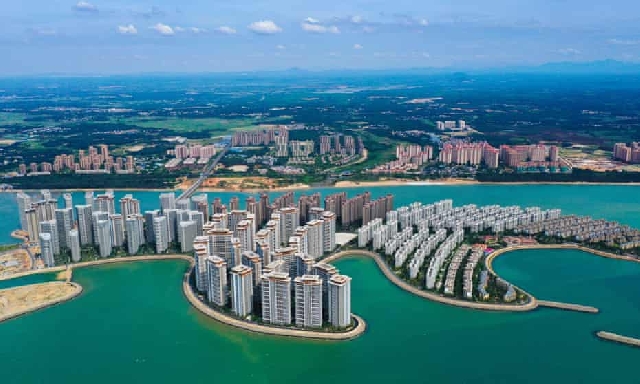Chinese real estate company ordered to tear down 39 buildings with illegal permits
 Chinese media reported over the weekend that authorities in Hainan province — a tropical resort island off the coast of southern China — had ordered Evergrande to demolish 39 buildings
Chinese media reported over the weekend that authorities in Hainan province — a tropical resort island off the coast of southern China — had ordered Evergrande to demolish 39 buildings
Troubled Chinese real estate developer Evergrande is trying to reassure investors about the impact of an official order to demolish a few dozen buildings in China.
Chinese media reported over the weekend that authorities in Hainan province — a tropical resort island off the coast of southern China — had ordered Evergrande to demolish 39 buildings, saying that the building permits had been illegally obtained.
The company acknowledged the order in a post on WeChat on Monday night but added that it did not affect other buildings in the same property project, which involve some 61,000 property owners.
The 39 buildings are part of Evergrande's gigantic Ocean Flower Island project in Hainan, in which the company has invested nearly $13 billion over the last six years.
The company suspended trading in its shares in Hong Kong on Monday. In a filing with the Hong Kong Stock Exchange on Tuesday, the company said it would resume trading, and confirmed that it would "actively communicate" with authorities about the Ocean Flower Island project and "resolve the issue properly."
Shares surged as much as 10% after trading started in early afternoon, before paring gains. They were last up 1.3%.
In Tuesday's filing, Evergrande also said it has achieved contracted sales of 443.02 billion yuan ($70 billion) for 2021. That was down 39% from 2020's sales figure. And regarding liquidity, the company said it would continue to "actively maintain communication with creditors, strive to resolve risks and safeguard the legitimate rights and interests of all parties."
In Tuesday's filing, Evergrande also said it has achieved contracted sales of 443.02 billion yuan ($70 billion) for 2021. That was down 39% from 2020's sales figure. And regarding liquidity, the company said it would continue to "actively maintain communication with creditors, strive to resolve risks and safeguard the legitimate rights and interests of all parties."
Evergrande which was China's second-largest property developer by sales in 2020 — is reeling under more than $300 billion of total liabilities.
It has been scrambling for months to raise cash to repay lenders, and the company's chairman Xu Jiayin has been reportedly selling off personal assets to prop up its finances. But that doesn't seem enough to avoid default.
In December, Fitch Ratings declared that the company had defaulted on its debt, a downgrade the credit ratings agency said reflected Evergrande's inability to pay interest due that month on two dollar-denominated bonds.
Analysts have been long concerned that a collapse by Evergrande could trigger wider risks for China's property market, hurting homeowners and the broader financial system. Real estate and related industries account for as much as 30% of the country's GDP. The US Federal Reserve warned in November that trouble in Chinese real estate could damage the global economy.
There's already plenty of evidence that Beijing is taking a leading role in guiding Evergrande through a restructuring of its debt and sprawling business operations.
But analysts warned, though, that the real estate crisis remains a looming threat for China.
Source: CNN
Trending Business

Tema port delays threaten livelihoods as importers battle mounting demurrage costs
12:17
President Mahama launches major youth employment initiatives: Adwumawura and National Apprenticeship programme
11:25
IMF boss applauds Ghana’s economic turnaround under Mahama administration
03:35
NIB MD champions community-led development at Kwahu Business Forum
03:14
Angel Group CEO engages Free Zones Authority on strategic expansion plans
03:52
President Mahama swears in Matilda Asante-Asiedu as Second Deputy Governor of Bank of Ghana
02:58
Minister of Energy and Finance engage Karpower on legacy debt
17:21
CEMSE urges PUWU to support private sector involvement in ECG revenue mobilisation
14:19
COCOBOD halts Cocoa roads projects over GH¢4 billion debt – CEO
10:09
Free Zones Authority CEO visits Blue Skies juice factory in Dobro-Nsawam
03:57



